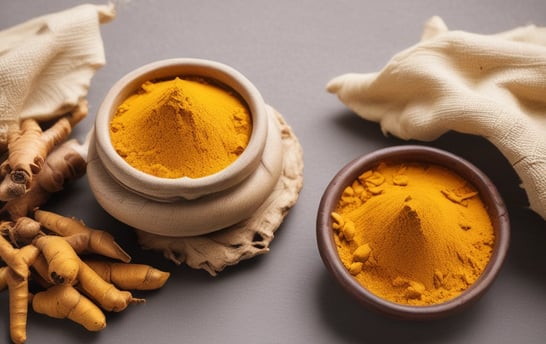Turmeric
Discover life-saving natural remedies that replace toxic pharmaceuticals. Strengthen your immune system with trusted, third-party tested supplements. Say goodbye to addictive drugs and embrace a healthier, more hopeful life filled with dreams and vitality. Join us on this journey towards all-natural wellness and optimal health today!
HEALING & PAIN RELIEF
12/24/20242 min read


Turmeric, a vibrant yellow spice commonly used in cooking, especially in Indian and Southeast Asian cuisines, offers a wide range of potential health benefits due to its active compound, curcumin. Here are some of the key benefits of turmeric:
1. Anti-Inflammatory Properties
Curcumin, the active compound in turmeric, has strong anti-inflammatory effects. It can help reduce inflammation in the body, which is beneficial for conditions like arthritis, inflammatory bowel disease, and general chronic inflammation.
2. Antioxidant Effects
Turmeric is a powerful antioxidant. It helps neutralize free radicals in the body, protecting cells from damage and reducing oxidative stress, which is linked to aging and various diseases.
3. Supports Joint Health
Due to its anti-inflammatory properties, turmeric is often used to alleviate symptoms of joint pain, stiffness, and swelling, particularly in conditions like osteoarthritis and rheumatoid arthritis.
4. Improves Digestion
Turmeric has been shown to support healthy digestion by promoting bile production, which aids in fat digestion. It can also reduce bloating, gas, and indigestion, and it has been traditionally used to soothe an upset stomach.
5. Boosts Immune System
The anti-inflammatory and antioxidant properties of turmeric can help boost the immune system. It has been traditionally used in Ayurveda to fight infections and promote overall health.
6. Brain Health
Curcumin has been shown to increase levels of brain-derived neurotrophic factor (BDNF), a protein linked to improved brain function and a reduced risk of neurological diseases like Alzheimer's. It may also help protect against cognitive decline and improve memory.
7. Heart Health
Turmeric may help improve heart health by reducing cholesterol levels, improving blood vessel function, and decreasing the risk of heart disease. Its anti-inflammatory effects may also reduce the risk of atherosclerosis (plaque buildup in the arteries).
8. Mood Enhancement and Mental Health
Some studies suggest that turmeric may help in alleviating symptoms of depression and anxiety. Curcumin may help by increasing levels of neurotransmitters like serotonin and dopamine in the brain.
9. Cancer Prevention
While more research is needed, preliminary studies suggest that turmeric may have anticancer properties. Curcumin has been shown to inhibit the growth of cancer cells, particularly in cancers of the colon, breast, and prostate.
10. Skin Health
Turmeric has been used for centuries in skincare due to its antibacterial, anti-inflammatory, and antioxidant properties. It can help with conditions like acne, eczema, and psoriasis, and may also promote wound healing.
11. Supports Liver Health
Turmeric may help detoxify the liver by promoting bile production and acting as a liver protectant. It has also been used traditionally to prevent liver damage from toxins and alcohol.
12. Blood Sugar Regulation
Some studies suggest that turmeric may help manage blood sugar levels and improve insulin sensitivity, which is beneficial for people with diabetes or at risk of diabetes.
While turmeric offers many potential benefits, it's important to note that its bioavailability (how well it's absorbed by the body) can be low. Consuming turmeric with black pepper (which contains piperine) or fat can enhance its absorption. Also, it's best to consult with a healthcare provider before using turmeric supplements, especially for those with medical conditions or those on medication.
